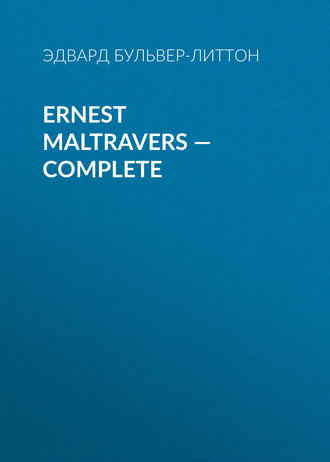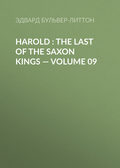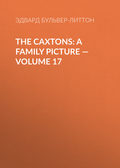
Эдвард Бульвер-Литтон
Ernest Maltravers — Complete
CHAPTER II
“You are once more a free woman;
Here I discharge your bonds.”
The Custom of the Country.
AND many were thy trials, poor child; many that, were this book to germinate into volumes more numerous than monk ever composed upon the lives of saint or martyr (though a hundred volumes contained the record of two years only in the life of St. Anthony), it would be impossible to describe! We may talk of the fidelity of books, but no man ever wrote even his own biography without being compelled to omit at least nine-tenths of the most important materials. What are three—what six volumes? We live six volumes in a day! Thought, emotion, joy, sorrow, hope, fear, how prolix would they be if they might each tell their hourly tale! But man’s life itself is a brief epitome of that which is infinite and everlasting; and his most accurate confessions are a miserable abridgment of a hurried and confused compendium!
It was about three months, or more, from the night in which Alice wept herself to sleep amongst those wild companions, when she contrived to escape from her father’s vigilant eye. They were then on the coast of Ireland. Darvil had separated himself from Walters—from his seafaring companions: he had run through the greater part of the money his crimes had got together; he began seriously to attempt putting into execution his horrible design of depending for support upon the sale of his daughter. Now Alice might have been moulded into sinful purposes before she knew Maltravers; but from that hour her very error made her virtuous—she had comprehended, the moment she loved, what was meant by female honour; and by a sudden revelation, she had purchased modesty, delicacy of thought and soul, in the sacrifice of herself. Much of our morality (prudent and right upon system) with respect to the first false step of women, leads us, as we all know, into barbarous errors as to individual exceptions. Where, from pure and confiding love, that first false step has been taken, many a woman has been saved in after life from a thousand temptations. The poor unfortunates who crowd our streets and theatres have rarely, in the first instances, been corrupted by love; but by poverty, and the contagion of circumstance and example. It is a miserable cant phrase to call them the victims of seduction; they have been the victims of hunger, of vanity, of curiosity, of evil female counsels; but the seduction of love hardly ever conducts to a life of vice. If a woman has once really loved, the beloved object makes an impenetrable barrier between her and other men; their advances terrify and revolt—she would rather die than be unfaithful even to a memory. Though man love the sex, woman loves only the individual; and the more she loves him, the more cold she is to the species. For the passion of woman is in the sentiment—the fancy—the heart. It rarely has much to do with the coarse images with which boys and old men—the inexperienced and the worn-out—connect it.
But Alice, though her blood ran cold at her terrible father’s language, saw in his very design the prospect of escape. In an hour of drunkenness he thrust her from the house, and stationed himself to watch her—it was in the city of Cork. She formed her resolution instantly—turned up a narrow street, and fled at full speed. Darvil endeavoured in vain to keep pace with her—his eyes dizzy, his steps reeling with intoxication. She heard his last curse dying from a distance on the air, and her fear winged her steps: she paused at last, and found herself on the outskirts of the town. She paused, overcome, and deadly faint; and then, for the first time, she felt that a strange and new life was stirring within her own. She had long since known that she bore in her womb the unborn offspring of Maltravers, and that knowledge had made her struggle and live on. But now, the embryo had quickened into being—it moved—it appealed to her, a—thing unseen, unknown; but still it was a living creature appealing to a mother! Oh, the thrill, half of ineffable tenderness, half of mysterious terror, at that moment!—What a new chapter in the life of a woman did it not announce:—Now, then, she must be watchful over herself—must guard against fatigue—must wrestle with despair. Solemn was the trust committed to her—the life of another—the child of the Adored. It was a summer night—she sat on a rude stone, the city on one side, with its lights and lamps;—the whitened fields beyond, with the moon and the stars above; and above she raised her streaming eyes, and she thought that God, the Protector, smiled upon her from the face of the sweet skies. So, after a pause and a silent prayer, she rose and resumed her way. When she was wearied she crept into a shed in a farmyard, and slept, for the first time for weeks, the calm sleep of security and hope.
CHAPTER III
“How like a prodigal doth she return,
With over-weathered ribs and ragged sails.”
Merchant of Venice.
“Mer. What are these?
Uncle. The tenants.”
BEAUMONT AND FLETCHER.—Wit without Money.
IT was just two years from the night in which Alice had been torn from the cottage: and at that time Maltravers was wandering amongst the ruins of ancient Egypt, when, upon the very lawn where Alice and her lover had so often loitered hand in hand, a gay party of children and young people were assembled. The cottage had been purchased by an opulent and retired manufacturer. He had raised the low thatched roof another story high—and blue slate had replaced the thatch—and the pretty verandahs overgrown with creepers had been taken down because Mrs. Hobbs thought they gave the rooms a dull look; and the little rustic doorway had been replaced by four Ionic pillars in stucco; and a new dining-room, twenty-two feet by eighteen, had been built out at one wing, and a new drawing-room had been built over the new dining-room. And the poor little cottage looked quite grand and villa-like. The fountain had been taken away, because it made the house damp; and there was such a broad carriage-drive from the gate to the house! The gate was no longer the modest green wooden gate, ever ajar with its easy latch; but a tall, cast-iron, well-locked gate, between two pillars to match the porch. And on one of the gates was a brass plate, on which was graven, “Hobbs’ Lodge—Ring the bell.” The lesser Hobbses and the bigger Hobbses were all on the lawn—many of them fresh from school—for it was the half-holiday of a Saturday afternoon. There was mirth, and noise, and shouting and whooping, and the respectable old couple looked calmly on; Hobbs the father smoking his pipe (alas, it was not the dear meerschaum); Hobbs the mother talking to her eldest daughter (a fine young woman, three months married, for love, to a poor man), upon the proper number of days that a leg of mutton (weight ten pounds) should be made to last. “Always, my dear, have large joints, they are much the most saving. Let me see—what a noise the boys do make! No, my love, the ball’s not here.”
“Mamma, it is under your petticoats.”
“La, child, how naughty you are!”
“Holla, you sir! it’s my turn to go in now. Biddy, wait,—girls have no innings—girls only fag out.”
“Bob, you cheat.”
“Pa, Ned says I cheat.”
“Very likely, my dear, you are to be a lawyer.”
“Where was I, my dear?” resumed Mrs. Hobbs, resettling herself, and readjusting the invaded petticoats. “Oh, about the leg of mutton!—yes, large joints are the best—the second day a nice hash, with dumplings; the third, broil the bone—your husband is sure to like broiled bones!—and then keep the scraps for Saturday’s pie;—you know, my dear, your father and I were worse off than you when we began. But now we have everything that is handsome about us—nothing like management. Saturday pies are very nice things, and then you start clear with your joint on Sunday. A good wife like you should never neglect the Saturday’s pie!”
“Yes,” said the bride, mournfully; “but Mr. Tiddy does not like pies.”
“Not like pies! that very odd—Mr. Hobbs likes pies—perhaps you don’t have the crust made thick eno’. How somever, you can make it up to him with a pudding. A wife should always study her husband’s tastes—what is a man’s home without love? Still a husband ought not to be aggravating, and dislike pie on a Saturday!”
“Holla! I say, ma, do you see that ‘ere gipsy? I shall go and have my fortune told.”
“And I—and I!”
“Lor, if there ben’t a tramper!” cried Mr. Hobbs, rising indignantly; “what can the parish be about?”
The object of these latter remarks, filial and paternal, was a young woman in a worn, threadbare cloak, with her face pressed to the openwork of the gate, and looking wistfully—oh, how wistfully!—within. The children eagerly ran up to her, but they involuntarily slackened their steps when they drew near, for she was evidently not what they had taken her for. No gipsy hues darkened the pale, thin, delicate cheek—no gipsy leer lurked in those large blue and streaming eyes—no gipsy effrontery bronzed that candid and childish brow. As she thus pressed her countenance with convulsive eagerness against the cold bars, the young people caught the contagion of inexpressible and half-fearful sadness—they approached almost respectfully—“Do you want anything here?” said the eldest and boldest of the boys.
“I—I—surely this is Dale Cottage?”
“It was Dale Cottage, it is Hobbs’ Lodge now; can’t you read?” said the heir of the Hobbs’s honours, losing, in contempt at the girl’s ignorance, his first impression of sympathy.
“And—and—Mr. Butler, is he gone too?”
Poor child! she spoke as if the cottage was gone, not improved; the Ionic portico had no charm for her!
“Butler!—no such person lives here. Pa, do you know where Mr. Butler lives?”
Pa was now moving up to the place of conference the slow artillery of his fair round belly and portly calves. “Butler, no—I know nothing of such a name—no Mr. Butler lives here. Go along with you—ain’t you ashamed to beg?”
“No Mr. Butler!” said the girl, gasping for breath, and clinging to the gate for support. “Are you sure, sir?”
“Sure, yes!—what do you want with him?”
“Oh, papa, she looks faint!” said one of the girls deprecatingly—“do let her have something to eat; I’m sure she’s hungry.”
Mr. Hobbs looked angry; he had often been taken in, and no rich man likes beggars. Generally speaking, the rich man is in the right. But then Mr. Hobbs turned to the suspected tramper’s sorrowful face and then to his fair pretty child—and his good angel whispered something to Mr. Hobbs’s heart—and he said, after a pause, “Heaven forbid that we should not feel for a poor fellow-creature not so well to do as ourselves. Come in, my lass, and have a morsel to eat.”
The girl did not seem to hear him, and he repeated the invitation, approaching to unlock the gate.
“No, sir,” said she, then; “no, I thank you. I could not come in now. I could not eat here. But tell me, sir, I implore you, can you not even guess where I may find Mr. Butler?”
“Butler!” said Mrs. Hobbs, whom curiosity had now drawn to the spot. “I remember that was the name of the gentleman who hired the place, and was robbed.”
“Robbed!” said Mr. Hobbs, falling back and relocking the gate—“and the new tea-pot just come home,” he muttered inly. “Come, be off, child—be off; we know nothing of your Mr. Butlers.”
The young woman looked wildly in his face, cast a hurried glance over the altered spot, and then, with a kind of shiver, as if the wind had smitten her delicate form too rudely, she drew her cloak more closely round her shoulders, and without saying another word, moved away. The party looked after her as, with trembling steps, she passed down the road, and all felt that pang of shame which is common to the human heart at the sight of a distress it has not sought to soothe. But this feeling vanished at once from the breast of Mrs. and Mr. Hobbs, when they saw the girl stop where a turn of the road brought the gate before her eyes; and for the first time, they perceived, what the worn cloak had hitherto concealed, that the poor young thing bore an infant in her arms. She halted, she gazed fondly back. Even at that instant the despair of her eyes was visible; and then, as she pressed her lips to the infant’s brow, they heard a convulsive sob—they saw her turn away, and she was gone!
“Well, I declare!” said Mrs. Hobbs.
“News for the parish,” said Mr. Hobbs; “and she so young too!—what a shame!”
“The girls about here are very bad nowadays, Jenny,” said the mother to the bride.
“I see now why she wanted Mr. Butler,” quoth Hobbs, with a knowing wink—“the slut has come to swear!”
And it was for this that Alice had supported her strength—her courage-during the sharp pangs of childbirth; during a severe and crushing illness, which for months after her confinement had stretched her upon a peasant’s bed (the object of the rude but kindly charity of an Irish shealing)—for this, day after day, she had whispered to herself, “I shall get well, and I will beg my way to the cottage, and find him there still, and put my little one into his arms, and all will be bright again;”—for this, as soon as she could walk without aid, had she set out on foot from the distant land; for this, almost with a dog’s instinct (for she knew not what way to turn—what county the cottage was placed in; she only knew the name of the neighbouring town; and that, populous as it was, sounded strange to the ears of those she asked; and she had often and often been directed wrong),—for this, I say, almost with a dog’s faithful instinct, had she, in cold and heat, in hunger and in thirst, tracked to her old master’s home her desolate and lonely way! And thrice had she over-fatigued herself—and thrice again been indebted to humble pity for a bed whereon to lay a feverish and broken frame. And once, too, her baby—her darling, her life of life, had been ill—had been near unto death, and she could not stir till the infant (it was a girl) was well again, and could smile in her face and crow. And thus many, many months had elapsed, since the day she set out on her pilgrimage, to that on which she found its goal. But never, save when the child was ill, had she desponded or abated heart and hope. She should see him again, and he would kiss her child. And now—no—I cannot paint the might of that stunning blow! She knew not, she dreamed not, of the kind precautions Maltravers had taken; and he had not sufficiently calculated on her thorough ignorance of the world. How could she divine that the magistrate, not a mile distant from her, could have told her all she sought to know? Could she but have met the gardener—or the old woman-servant—all would have been well! These last, indeed, she had the forethought to ask for. But the woman was dead, and the gardener had taken a strange service in some distant county. And so died her last gleam of hope. If one person who remembered the search of Maltravers had but met and recognised her! But she had been seen by so few—and now the bright, fresh girl was so sadly altered! Her race was not yet run, and many a sharp wind upon the mournful seas had the bark to brave before its haven was found at last.
CHAPTER IV
“Patience and sorrow strove
Which should express her goodliest.”
—SHAKESPEARE.
“Je la plains, je la blame, et je suis son appui.”12
-VOLTAIRE.
AND now Alice felt that she was on the wide world alone, with her child—no longer to be protected, but to protect; and after the first few days of agony, a new spirit, not indeed of hope, but of endurance, passed within her. Her solitary wanderings, with God her only guide, had tended greatly to elevate and confirm her character. She felt a strong reliance on His mysterious mercy—she felt, too, the responsibility of a mother. Thrown for so many months upon her own resources, even for the bread of life, her intellect was unconsciously sharpened, and a habit of patient fortitude had strengthened a nature originally clinging and femininely soft. She resolved to pass into some other county, for she could neither bear the thoughts that haunted the neighbourhood around her, nor think, without a loathing horror, of the possibility of her father’s return. Accordingly, one day, she renewed her wanderings—and after a week’s travel, arrived at a small village. Charity is so common in England, it so spontaneously springs up everywhere, like the good seed by the roadside, that she had rarely wanted the bare necessaries of existence. And her humble manner, and sweet, well-tuned voice, so free from the professional whine of mendicancy, had usually its charm for the sternest. So she generally obtained enough to buy bread and a night’s lodging, and, if sometimes she failed, she could bear hunger, and was not afraid of creeping into some shed, or, when by the sea-shore, even into some sheltering cavern. Her child throve too—for God tempers the wind to the shorn lamb! But now, so far as physical privation went, the worst was over.
It so happened that as Alice was drawing herself wearily along to the entrance of the village which was to bound her day’s journey, she was met by a lady, past middle age, in whose countenance compassion was so visible, that Alice would not beg, for she had a strange delicacy or pride, or whatever it may be called, and rather begged of the stern than of those who looked kindly at her—she did not like to lower herself in the eyes of the last.
The lady stopped.
“My poor girl, where are you going?”
“Where God pleases, madam,” said Alice.
“Humph! and is that your own child?—you are almost a child yourself.”
“It is mine, madam,” said Alice, gazing fondly at the infant; “it is my all!”
The lady’s voice faltered. “Are you married?” she asked.
“Married!—Oh, no, madam!” replied Alice, innocently, yet without blushing, for she never knew that she had done wrong in loving Maltravers.
The lady drew gently back, but not in horror—no, in still deeper compassion; for that lady had virtue, and she knew that the faults of her sex are sufficiently punished to permit Virtue to pity them without a sin.
“I am sorry for it,” she said, however, with greater gravity. “Are you travelling to seek the father?”
“Ah, madam! I shall never see him again!” And Alice wept.
“What!—he has abandoned you—so young, so beautiful!” added the lady to herself.
“Abandoned me!—no, madam; but it is a long tale. Good evening—I thank you kindly for your pity.”
The lady’s eyes ran over.
“Stay,” said she; “tell me frankly where you are going, and what is your object.”
“Alas! madam, I am going anywhere, for I have no home; but I wish to live, and work for my living, in order that my child may not want for anything. I wish I could maintain myself—he used to say I could.”
“He!—your language and manner are not those of a peasant. What can you do? What do you know?”
“Music, and work, and—and—”
“Music!—this is strange! What were your parents?”
Alice shuddered, and hid her face with her hands.
The lady’s interest was now fairly warmed in her behalf.
“She has sinned,” said she to herself; “but at that age, how can one be harsh? She must not be thrown upon the world to make sin a habit. Follow me,” she said, after a little pause; “and think you have found a friend.”
The lady then turned from the high-road down a green lane which led to a park lodge. This lodge she entered; and after a short conversation with the inmate, beckoned to Alice to join her.
“Janet,” said Alice’s new protector to a comely and pleasant-eyed woman, “this is the young person—you will show her and the infant every attention. I shall send down proper clothing for her to-morrow, and I shall then have thought what will be best for her future welfare.”
With that the lady smiled benignly upon Alice, whose heart was too full to speak; and the door of the cottage closed upon her, and Alice thought the day had grown darker.







